In the current political landscape, a troubling trend emerges: the hasty labeling of dissenting voices as threats. The recent announcement by Home Secretary Yvette Cooper regarding the proscription of Palestine Action as a terrorist organization exemplifies this phenomenon. This decision, made in the wake of an incident where activists breached the security of RAF Brize Norton, underscores a broader pattern of governmental overreach when confronted with grassroots activism. It begs the question: Are we witnessing legitimate security measures or the suppression of vital discourse?
The act of labeling Palestine Action—a group that has garnered attention for its property destruction campaigns—as terrorists is not just draconian; it is arguably a tactic to silence dissent. The government’s reaction to the breach at Raf Brize Norton, characterized by Cooper as a “disgraceful attack,” signals a misdirected priority where property damage is treated with the same gravity as violent extremism. The stark contrast between the physical ramifications of vandalism and the ideological motivations driving individuals to act disruptively should not be conflated.
Public Sentiment and Civil Rights
This proscription is not occurring in a vacuum. It arises amidst a potent blend of public sentiment surrounding protests, particularly those advocating for Palestinian rights. While some might argue that Palestine Action’s tactics are extreme, it is essential to recognize that peaceful dialogue and traditional protest methods have often failed to generate substantive change. Ironically, the government’s heavy-handedness could tacitly boost Palestine Action’s visibility and support among those who feel disenfranchised by the mainstream political discourse.
By positioning itself against Palestine Action, the government risks alienating a segment of the population that seeks to voice legitimate grievances, highlighting severe flaws in foreign policy and military involvement. Cooper’s assurance that peaceful protest is unaffected by the proscription is ironic given that the bulk of activism is inherently disruptive. The real danger lies in the potential chilling effect this move has on individuals contemplating advocacy for widespread social justice issues.
Security or Silencing? A False Dichotomy
In the wake of the announced proscription, politicians and law enforcement officials paint a vivid picture of a security crisis requiring urgent action. Armed Forces Minister Luke Pollard’s commitment to reviewing security measures at military installations may sound reasonable, but equating the actions of Palestine Action with terrorist activities diminishes the threshold for what qualifies as a genuine threat. In an age where misinformation can incite panic and overreaction, relying on such comparisons dilutes the real challenges our security forces face.
Saaed Taji Farouky’s assertions regarding the proscription’s irrationality resonate with many, as there exists a thin line between legitimate concern for public safety and an authoritarian impulse to stifle fighting voices. To reference “humiliation” over security breaches as a negotiating point shows a government more intent on self-preservation than on genuinely addressing the deep-seated issues that catalyze movements like Palestine Action.
Implications for Activism and Civil Liberties
The decision to classify Palestine Action as a terrorist organization holds severe implications, not just for the group but for the fabric of activism in general. By inflating threats and drawing connections between various forms of protest, the government is laying the groundwork for further civil liberties encroachments. For activists, this creates an environment steeped in fear—fear that legitimate protests will not only be met with resistance but might also lead to labeling and criminal consequences.
The police’s action during recent protests in London, with 13 arrests made during largely peaceful demonstrations, raises additional red flags regarding how dissent will be managed moving forward. The Metropolitan Police’s description of being “surrounded” at protests sounds more like a narrative spun to justify their heavy-handedness rather than an accurate portrayal of events. The response to these protests, coupled with the government’s plans to curb them through proscription, frames activism not as a necessary element of democracy but as a threat to safety and order.
In an era where governments increasingly conflate dissent with danger, every voice matters. To stifle those voices is to erode the very principles of democracy.

Leave a Reply